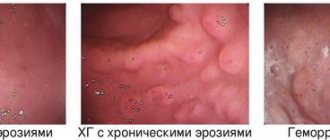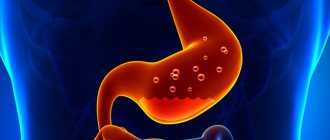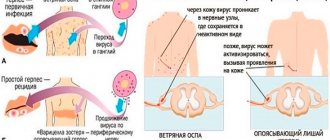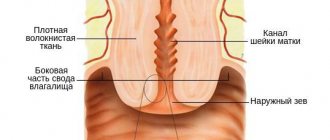Types of gastritis
The largest division of gastritis is acute and chronic. The first occurs immediately after irritating factors come into contact with the gastric mucosa. In case of improper nutrition, it manifests itself in a catarrhal form, in case of poisoning or infection - in a fibrinous form.
Chronic is often caused by the bacterium Helicobacter pylori. The disease is characterized by a sluggish course with periodic exacerbations. Based on the localization of the inflammatory process, the following forms are distinguished:
- antrum - in the lower part of the stomach;
- fundal - in the middle section (sometimes extends to the bottom of the organ);
- reflux gastritis - in the area of the pylorus of the stomach.
The chronic type of the disease is characterized by dysfunction of gastric secretion. Its excessive activity causes increased acidity (this form is called hyperacid). With secretory insufficiency, acidity is reduced (this form is called anacid).
Types of damage to the mucous membrane
Gastritis can also be classified according to the degree of change in the gastric mucosa. The mildest form is superficial, when the inflammatory process affects only the upper part of the mucosa. More dangerous forms include the following:
Although hyperplastic gastritis is characterized by the appearance of neoplasms, they are predominantly benign.
The atrophic form often leads to stomach cancer. Each of these types can be focal or diffuse: the first covers a small area of the mucous membrane (although there may be several of them), the second spreads over its entire surface.
Types of gastritis by etiology
The mucous membrane of the stomach can become inflamed for various reasons. Gastroenterologists, according to this criterion, divide diseases into several groups:
There are also mixed types. Thus, AC inflammation means that reflux is caused by autoimmune factors. It happens that autoimmune effects are combined with Helicobacter pylori infection. Then we are talking about AB gastritis.
How to help children
Poor diet in children can cause gastritis.
Despite the fact that the principles of first aid for an acute attack of gastritis are the same for everyone, when treating children, measures should be relaxed a little. Gastritis in children most often manifests itself at school age, when parental control over nutrition and daily routine becomes weaker.
The causes of gastritis in children are still the same - poor diet, intolerance and allergic reactions to certain foods, infections that cause intoxication. The problem of diagnosing gastritis in young children is the impossibility of determining the cause of the painful condition based on symptoms - to be sure, a conclusion from a gastroenterologist and an analysis for salmonellosis are necessary.
If a child exhibits the same symptoms as an adult, you should immediately call a doctor at home and try to provide first aid yourself. However, the assistance provided to the child has its own characteristics:
- Gastric lavage is done with a solution of 0.5% baking soda, non-carbonated mineral or clean boiled water.
- A heating pad with warm water is placed on the epigastric region, and a warm compress is placed on the stomach.
- The child is advised to drink plenty of warm water, however, feeding him during an attack is strictly prohibited, as this can only aggravate the situation.
- In case of severe pain, you should give an antispasmodic agent - no-shpa (dosage according to instructions) or belladonna tincture (5-10 drops).
- Bed rest after an attack must be observed for 2-3 days, but you can only fast for the first 8-12 hours after the condition worsens.
A child can be hospitalized only in case of a sharp deterioration in the condition - incessant vomiting or severe dehydration. If there is a large loss of fluid, it is urgently necessary to replace it intravenously.
Causes of acute gastritis
This disease appears suddenly. In rare cases, the cause may be the bacteria Helicobacter pylori entering the body. But usually it does not make itself felt instantly, but is the causative agent of sluggish chronic gastritis.
It is usually not difficult for an adult to determine the cause. It is enough to analyze what he ate and drank several hours before the attack. Inflammation can be caused by:
Infections can also cause an attack. Among the most likely, gastroenterologists identify cytomegaloverus, syphilis, and staphylococcus infection. People with weakened immune systems are more likely to become infected. Another reason for the development of an acute inflammatory process is exposure to bile. This only applies to type C gastritis.
Causes of development of chronic gastritis
The second most important cause of chronic inflammation of the gastric mucosa (after the bacterium Helicobacter pylori) is poor nutrition. This includes not only harmful products. Violation of the eating schedule is also detrimental to the stomach. Inflammation can result from:
The influence of other diseases (endocrine, metabolic, infectious, hypoxic) cannot be excluded. External factors (harmful working conditions, stress) also become causes of gastritis.
What bad habits can cause gastritis?
The most common cause of gastritis is the habit of eating poorly and chewing food poorly. Poor nutrition should be understood as: drinking coffee and sweets on an empty stomach, non-compliance with the diet, abuse of smoked, fatty and spicy foods. Surely you have noticed that if you chew your food poorly and quickly “push it down” (seemingly full), then this is self-deception. Then, of course, there will be a feeling of discomfort in the stomach, pain, etc.
General signs of gastritis
Regardless of the type (acute or chronic), it always manifests itself as pain in the epigastric region (only its nature differs). Pain appears after eating or, conversely, from hunger. Other symptoms from the digestive system are possible:
Symptoms in adults are more severe than in children. In children, attacks are often accompanied by weakness, fever, and bruises under the eyes. Parents may confuse the first signs of gastritis with poisoning.
Another noticeable symptom of many types of this disease is a white (less often yellow) coating on the tongue. It is not cleaned during normal hygiene procedures. In most cases, plaque indicates a decrease in acidity.
When to see a doctor
You should consult a doctor if you feel severe pain with gastritis of the stomach, since exacerbation of gastritis can cause a serious deterioration in health with an increase in the area of mucosal damage and transition to an ulcerative state. Gastritis is especially dangerous if there is increased acidity, since the juice tends to corrode the mucous membrane of the organ, resulting in the formation of ulcers. If, based on a number of signs, the patient has identified an exacerbation of gastritis, the symptoms of which are nausea to vomiting, complete loss of appetite, fever up to 39 degrees Celsius and severe pain, you should make an appointment with a specialist as quickly as possible.
Gastritis, the symptoms and treatment of which may vary in adults, is diagnosed by a gastroenterologist. The Center for Modern Medicine JSC "Medicine" (academician Roitberg's clinic) in Moscow offers diagnostic and treatment services for all types of gastritis using modern medical devices and drugs. More complete information on the topic “gastritis and its treatment in adults” can be obtained by clicking on the link. Our clinic is located at 2nd Tverskoy-Yamskaya Lane, building 10, a 5-minute walk from the Mayakovskaya metro station.
How to treat the disease
Since there are many types of gastritis, and each of them has its own causes, you cannot limit yourself to one treatment method. To combat each provoking factor, appropriate drugs are needed.
The doctor must determine by characteristic signs whether the patient’s acidity is increased or decreased. Depending on this, a suitable treatment regimen is selected.
Treatment of gastritis is usually complex, it is carried out in the following areas:
If the bacterium Helicobacter pylori is detected, it is important to eradicate it (complete destruction) with antibiotics. This is necessary to eliminate ulcerations, accelerate their healing and prevent the development of peptic ulcers and stomach cancer.
Nexium
This is a modern remedy for the treatment of gastritis and reflux disease, which has almost no side effects. Nexium is a proton pump inhibitor that permanently reduces the amount of acid in the stomach. Nexium helps relieve inflammation and heal stomach ulcers, and the effect after treatment lasts a long time. This drug for gastritis is not cheap, but the price is quite justified, especially since it can also be prescribed to children.
Nexium
AstraZeneca, Sweden
Gastroesophageal reflux disease: treatment of erosive reflux esophagitis;
long-term maintenance treatment after healing of erosive reflux esophagitis to prevent relapse; symptomatic treatment of gastroesophageal reflux disease; Peptic ulcer of the stomach and duodenum As part of combination therapy: treatment of duodenal ulcer associated with Helicobacter pylori; prevention of relapses of peptic ulcers associated with Helicobacter pylori. Long-term acid suppression therapy in patients who have suffered bleeding from a peptic ulcer (after intravenous use of drugs that reduce the secretion of gastric glands to prevent relapse). Patients taking NSAIDs for a long time: healing of gastric ulcers associated with taking NSAIDs; prevention of gastric and duodenal ulcers associated with taking NSAIDs in patients at risk. Zollinger-Ellison syndrome or other conditions characterized by pathological hypersecretion of the gastric glands, including from 127
1741
- Like
- Write a review
The next group of drugs are antacids, which eliminate excess acid in the stomach.
How is acidity level determined?
The main acid found in the stomach and determining its acidity level is hydrochloric acid. It is produced by parietal cells. The alkaline components of gastric juice neutralize hydrochloric acid. They are produced by accessory cells of the mucosa. The two substances interact and the acidity level changes throughout the day.
You can find out its level using intragastric pH-metry. To do this, a thin probe with a measuring electrode is placed into the patient's stomach. It gradually moves deeper and shows the pH in different areas of the organ.
In the part of the stomach where acid is produced, in an adult patient the pH should be from 1.6 to 2.0, and in the zone of alkali production and acid quenching - up to 5.2.
The doctor also pays attention to the symptoms. With high acidity, the patient suffers from heartburn, belching and a burning sensation in the throat; with low acidity, the patient suffers from bloating, flatulence and bad breath.
Treatment of acidity disorders
If there are signs of low acidity, replacement therapy with enzyme preparations is prescribed. Its main task is to normalize the production of pepsin. Preparations containing acedin-pepsin help with this. Drug stimulation of gastric juice secretion is also necessary.
If the diagnostic results reveal increased acidity, the patient is prescribed antacids. They neutralize acid, weaken the activity of pepsin, and in some cases have an enveloping effect. To eliminate symptoms, medications are recommended that stimulate gastrointestinal motility and relieve spasms of smooth muscles. Additionally, you can use folk remedies - herbs, flax seeds, potato juice.
Why are gastroprotectors needed?
To prevent complications such as peptic ulcers and malignant tumors, it is important to keep the structure of the mucous membrane intact. Gastroprotectors are used for these purposes:
They should be taken when signs of gastritis appear. The doctor will determine which medications will fit into the selected treatment package. For prevention purposes, you do not need to drink them.
The stomach contains natural gastroprotectors - prostaglandins. They stimulate the formation of mucus, improve microcirculation and protect cells from destruction. If they are not produced enough, the gastroenterologist may prescribe their synthetic analogues. If the patient is being treated with non-steroidal anti-inflammatory drugs, drugs with prostaglandins prevent ulcerative lesions of the mucous membrane.
Complications
The main cause of complications is the chronic form of the disease. If signs of chronic gastritis appear, but the patient does not consult a doctor, the following complications may occur:
- anemia;
- atrophic gastritis;
- leptic ulcers;
- benign or malignant tumors on the mucosa.
The only way to restore health is to promptly consult a qualified doctor who will give recommendations on how to treat gastritis. Taking pills for gastritis on your own is not recommended, so as not to provoke an exacerbation of the disease and its transition to a severe form. The likelihood of complications depends on what patients with chronic gastritis eat.
Preventive measures
Since gastritis is now diagnosed not only in adults, but also in children, prevention should begin as early as possible. First of all, you should normalize your diet:
When the first symptoms of inflammation of the gastric mucosa appear, it is important to minimize (or better yet eliminate) the consumption of chocolate, coffee, spicy and fried foods.
Gastroenterologists recommend regularly checking for parasitic infestations. When they are detected, it is important to carry out timely treatment, because they often attack the digestive system.
How to make an appointment with a gastroenterologist
You can make an appointment with a gastroenterologist at our multidisciplinary medical center at 2nd Tverskoy-Yamskaya Lane, building 10 in the following ways:
- use the form on the website;
- use the phone +7 (495) 775-73-60 around the clock.
JSC "Medicine" (clinic of academician Roitberg) also offers services to call a gastroenterologist at home and by phone +7 (495) 775-73-60 around the clock.
JSC "Medicine" (clinic of academician Roitberg) is located a 5-minute walk from the "Mayakovskaya" metro station.








